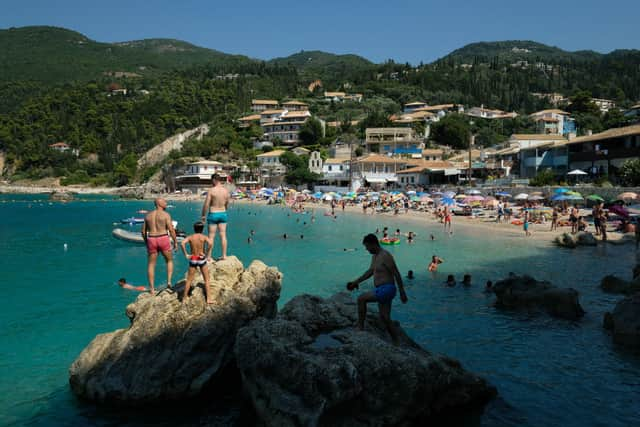Warning to UK tourists over Greece travel rule that could land you £2,500 fine
and live on Freeview channel 276
UK holidaymakers heading to Greece this summer should be wary of some little-known local laws and customs that could result in a hefty fine if broken.
Greece is one of Europe’s most popular holiday destinations thanks to its beautiful sandy shores, but visitors must be mindful not to bring a slice of the beach back home with them.
Advertisement
Hide AdAdvertisement
Hide AdIn some parts of the country it is against the law to take pebbles or sand from beaches, and those who do could face paying fines of hundreds or even thousands of pounds.


According to research from Parkdean Resorts, taking pebbles from the beach could result in a fine of €900 - around £771. Meanwhile, those who take sand from beaches in Sardinia could face an even bigger fin of up to €3,000 - around £2,569.
But it’s not just beaches where local laws apply, as Greece has strict rules in place for those visiting its many ancient monuments. Since 2009, it has been strictly forbidden by law to wear high heels when visiting ancient sites in Greece, including at the Acropolis, the Odeon of Herodes Atticus in Athens and the Epidaurus Theatre in the Peloponnese region.
The rule was introduced amid concerns that wearing heels could cause damage to the historic sites, particularly to the stone and marble floors found at these venues. As such, visitors should stick to flats when touring these attractions.
Advertisement
Hide AdAdvertisement
Hide AdIt is expected that around 30,000 British tourists are due to travel to Greece for summer getaways over the next few weeks, according to The Times, but the country is currently battling wildfires in several areas due to extreme temperatures of up to 40C.
Thousands of Britons have been rescued from the fire-ravaged island of Rhodes this week and evacuations have also been ordered on the islands of Corfu and Evia as blazes spread.
Wildfires have since reached the outskirts of Athens as strong gusts of wind caused flare-ups around Greece, disrupting motorway traffic and rail services.


The fires have been raging across parts of the country during three successive Mediterranean heatwaves over the past two weeks, leaving five people dead, including two firefighting pilots, and triggering a huge evacuation of tourists.
Advertisement
Hide AdAdvertisement
Hide AdWater-dropping helicopters and a ground crew were called early on Thursday (27 July) to a blaze in Kifissia, just north of Athens, which was quickly put out, and a wildfire burned on two fronts near the central city of Volos,forcing a section of Greece’s busiest motorway to shut for several hours, while national rail services passing through the area were delayed.
Despite the ongoing fires, the UK Foreign Office is not advising against travel to Greece, but recommends that anyone due to travel to an area of Greece that might be affected by wildfires to contact their travel operator, or accommodation provider, before travelling. It also advised that holidaymakers get “appropriate insurance” that covers “your itinerary, planned activities and expenses in an emergency”.
In an update this week, the government body said: “Be cautious if you are in or near an area affected by wildfires. You should:
- follow the guidance of the emergency services
- call the Greek Emergency Services on 112 if you are in immediate danger
- contact your airline or travel operator who can assist you with return travel to the UK.
- enable the “Emergency Alerts” option to receive the Greek government’s emergency alerts:
- for iPhones go to Settings > Notification. Enable the “Emergency Alerts” option at the bottom.
- for Android 11 and higher go to Settings > Notifications > Advanced Settings > Wireless Emergency Alerts
- for Samsung Devices go to Settings > Apps > Messages > Notifications > Emergency Notifications. Enable the “Emergency Alerts” option
- read the Greek Government’s protection guidelines in the event of a forest fire.
- register via the Greek government’s Emergency Communication Service (in Greek)
“The Greek government has set up a Crisis Management Unit to facilitate the evacuation of foreign visitors from Rhodes due to the ongoing forest fires. Contact them for advice on:
- +30 210 368 1730
- +30 210 368 1259
- +30 210 368 1350
“If you are a British national and need consular assistance, call our 24-hour helpline on +44 20 7008 5000.”
Comment Guidelines
National World encourages reader discussion on our stories. User feedback, insights and back-and-forth exchanges add a rich layer of context to reporting. Please review our Community Guidelines before commenting.
